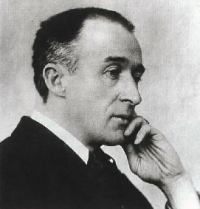On this date in 1862, composer Fritz Theodor Albert Delius was born in England to parents who had emigrated from Germany and had 14 children. In 1884 he moved to Florida at his father’s behest to manage an orange plantation, staying for about 18 months. While there he became enchanted with African-American music, which would be documented in his “Florida Suite.” He studied at the Leipzig Conservatorium, then moved to Paris, composing vocal and instrumental works and orchestral pieces along with the operas “Irmelin” and “The Magic Fountain.”
His inspiration derived from the literature of England, Norway, Denmark, Germany and France, medieval romance, North American Indians and African-Americans, the Florida landscape and the Scandinavian mountainscape. His operatic masterpiece was “A Village Romeo and Juliet,” followed by “Appalachia,” “Sea Drift” and “A Mass of Life.” Then came “Songs of Sunset,” “Brigg Fair,” “In a Summer Garden,” the opera “Fennimore and Gerda,” “An Arabesque,” “The Song of the High Hills” and from 1911-12 came the popular “On hearing the first cuckoo in spring” and “Summer night on the river.” He produced many more concertos and orchestral/choral works.
Delius was a lifelong freethinker. He was “always ready to poke fun at the religious beliefs of his friends” (Grieg and Delius: A Chronicle of their Friendship in Letters by Lionel Carley.) In a letter to Edvard Grieg, Delius wrote, “I think the only improvement that Christ and Christianity have brought with them is Christmas. As people really then think a little about others. Otherwise I feel that he had better not have lived at all. The world has not got any better, but worse & more hypocritical, & I really believe that Christianity has produced an overall submediocrity & really only taught people the meaning of fear.” (Carley)
Close friend Eric Denby wrote an intimate biography in 1936 of Delius’s final years. “He had no faith in God,” Fenby wrote, “Nevertheless … my admiration for Delius’s music will in no wise have suffered thereby.” Fenby, a strong believer, often found himself a helpless punching bag for Delius’s criticisms of religion. “God? I don’t know him. Given a young composer of genius, the surest way to ruin him is to make a Christian of him.”
Delius married the German artist Jelka Rosen, a friend of Auguste Rodin and a regular exhibitor at the Salon des Indépendants, in 1903. They shared a passion for the works of Nietzsche and Grieg and moved to Grez-sur-Loing, a village 40 miles from Paris, where they lived together for the rest of their lives except for a period during World War I. They had no children and he was not a faithful husband, which Jelka seemed to accept. Delius was increasingly affected by the symptoms of syphilis that he had probably contracted in the 1880s. By 1928 he was partially paralyzed and blind. He died at age 72 in 1934. She died the next year and they share a grave in England. (D. 1934)


